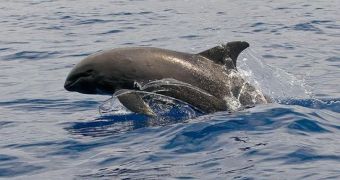A report released this September 25 is the first to blame sonar mapping for a mass whale stranding. Thus, the report shows that the whales that beached themselves in Madagascar a few years ago only did so because the acoustic stimuli produced by a high-frequency mapping sonar system greatly affected their behavior.
The mass whale stranding analyzed in this report occurred in northwestern Madagascar back in 2008.
At that time, some 100 melon-headed whales beached themselves in the Loza Lagoon system. Conservationists managed to return some of them to the sea. Unfortunately, many passed away.
In order to determine the cause of this mass whale stranding, researchers conducted necropsies on the marine mammals that died. Besides, they examined environmental factors that may have contributed to the animals' demise.
According to EurekAlert, specialists eventually concluded that, all things considered, this mass whale stranding occurred due to noise pollution caused by a high-frequency mapping sonar system used by ExxonMobil Exploration and Production Northern Madagascar Limited.
“This conclusion is based on very close temporal and spatial association and directed movement of the MBES [multi-beam echosounder system] survey with the stranding event,” the researchers write in their report.
What they mean is that noise pollution caused by the survey vessel was heard over hundreds of square miles of these creatures' natural habitats, and that the strandings occurred not long after the MBES survey was carried out.
In light of these findings, conservationists urge that high officials better regulate noise pollution in seas and oceans.
“These sonar systems are widely used aboard military and research vessels for generating more precise bathymetry [underwater mapping],” says Dr. Howard Rosenbaum with the Wildlife Conservation Society.
“We now hope that these results will be used by industry, regulatory authorities, and others to minimize risks and to better protect marine life, especially marine mammal species that are particularly sensitive to increasing ocean noise from human activities,” he adds.

 14 DAY TRIAL //
14 DAY TRIAL //